★½
“Desperately in need of more kick.”
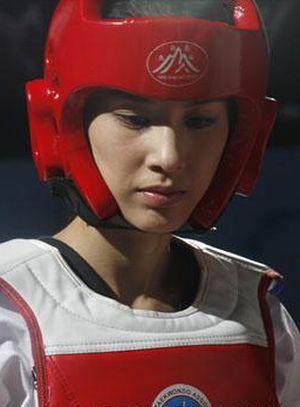 Hanging on the wall of the training gym in this film, is a banner on which is written in large letters: “WTF”. I imagine this is probably supposed to stand for “World Taekwondo Federation”, but it’s an unfortunate acronym for any organization. Says quite a bit that this is perhaps the most memorable thing, in what is not far from a Chinese knock-off of one of the more forgettable American martial-arts flicks of the 80’s, Best of the Best. Lingling (Huang) shows up one day at a failing taekwondo school run by Zhao Yumin (Liu), and asks to be trained for the national championships, even though she’s never fought before. Zhao sets her an impossible challenge, but when Lingling succeeds, is forced to take her on. As the rest of the film unfolds, we discover why the gym is failing – a former pupil died in a previous championship bout against the cockily brutal Gao Zhi (Cheng) – and also the reason for LingLing’s sudden interest in martial arts. If you’ve seen Best, you’ll probably be there already.
Hanging on the wall of the training gym in this film, is a banner on which is written in large letters: “WTF”. I imagine this is probably supposed to stand for “World Taekwondo Federation”, but it’s an unfortunate acronym for any organization. Says quite a bit that this is perhaps the most memorable thing, in what is not far from a Chinese knock-off of one of the more forgettable American martial-arts flicks of the 80’s, Best of the Best. Lingling (Huang) shows up one day at a failing taekwondo school run by Zhao Yumin (Liu), and asks to be trained for the national championships, even though she’s never fought before. Zhao sets her an impossible challenge, but when Lingling succeeds, is forced to take her on. As the rest of the film unfolds, we discover why the gym is failing – a former pupil died in a previous championship bout against the cockily brutal Gao Zhi (Cheng) – and also the reason for LingLing’s sudden interest in martial arts. If you’ve seen Best, you’ll probably be there already.
To give you some idea of how generally lame this is, the “impossible challenge” set for the heroine is… to go to a railway station and buy a ticket. We’re given no idea of why this is supposedly such a feat, because we don’t get to see any of it. Maybe it’s surrounded by a pit of crocodiles or something. Huang is also pretty unconvincing, with arms like twigs: before her climactic battle, we get to see her in one bout, which she wins with a gimmick move, so the viewer is never given any reason to feel that she has a realistic chance against Gao. That’s especially the case, after the only martial arts worthy of note, which is when he comes to the gym and basically demolishes an entire platoon of trainees.
The rest of the time is little more than a parade of martial-arts clichés, with Xie far too over-fond of the training montage as a cinematic device. Admittedly, my school of thought says “once” is about the limit, and you’d better have a good reason for doing it that often. Still, it’s in line with the other aspects: the characters are uninteresting, performances nothing special and, with the sole exception noted above, the fight sequences do little to generate excitement or interest. I note that the film is conveniently missing from Gordon Liu’s filmography on the IMDb: if I were in his shoes, I’d probably hope it stays that way.
Dir: Xie Yi
Star: Eva Huang, Gordon Liu, Mark Cheng, Daniel Chan





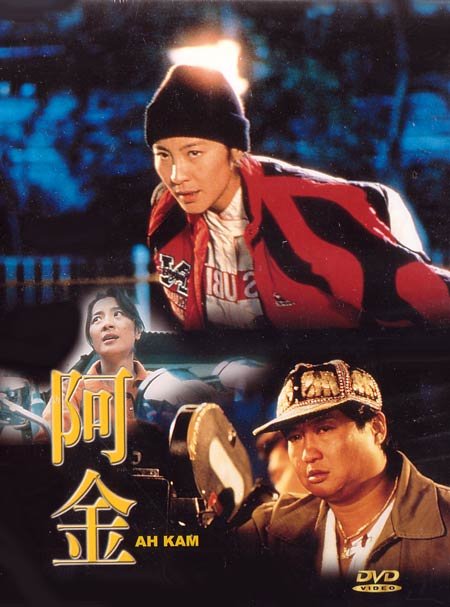
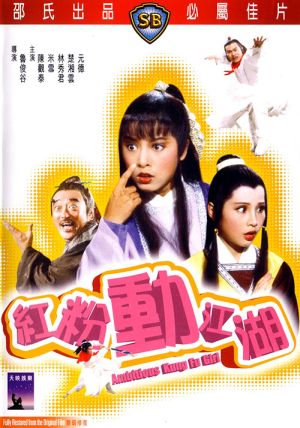 Tian Si Si (Yim) is a spoiled rich girl, whose doting daddy pays kung fu fighters to give the illusion that she can beat them up. Despite his desire to wed her off in an arranged marriage to Yang Fan (Tak), Si Si runs off to meet her idol, Qing Ge (Chen), a true master of the martial arts, whom she knows only through the fictional tales of derring-do, told by her maid. Susequently, Si Si becomes the target first of con-men, then is sold to a brother, and when they realize who she is, becomes the centre of a scheme to force her into marriage, so her husband can inherit her father’s fortune. Throughout it all, Yang is about the only loyal friend, though when she meets her idol, she discovers that, while if he isn’t as depicted, he still has a courageous streak of his own.
Tian Si Si (Yim) is a spoiled rich girl, whose doting daddy pays kung fu fighters to give the illusion that she can beat them up. Despite his desire to wed her off in an arranged marriage to Yang Fan (Tak), Si Si runs off to meet her idol, Qing Ge (Chen), a true master of the martial arts, whom she knows only through the fictional tales of derring-do, told by her maid. Susequently, Si Si becomes the target first of con-men, then is sold to a brother, and when they realize who she is, becomes the centre of a scheme to force her into marriage, so her husband can inherit her father’s fortune. Throughout it all, Yang is about the only loyal friend, though when she meets her idol, she discovers that, while if he isn’t as depicted, he still has a courageous streak of his own.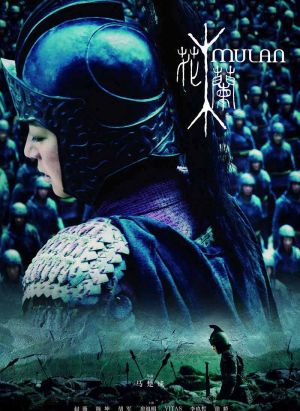 Inspired by the same poem as Disney’s much-loved feature, this has the same basic idea – a young woman impersonates a man in order to save her father from being drafted in the army. However, this takes a rather different approach, being much darker in tone, not that’s this is much of a surprise, I guess. It’s also a lot longer in scope, with Mulan (Zhao, whom you may recognize as the heroine/goalkeeper from Shaolin Soccer), rather than fighting a single campaign, becoming a career soldier and rising through the ranks as a result of her bravery in battle, eventually becoming a general, tasked with defending the Wei nation from the villainous Mendu (Hu). He has killed his own father in order to take control, and has united the nomadic tribes of the Rouran, amassing an army of 200,000 to invade Mulan’s home territory. She comes up with a plan to lure him into a trap, but when she is betrayed by a cowardly commander, things look bleak indeed for Mulan and Wentai (Chen), one of the few who know her secret.
Inspired by the same poem as Disney’s much-loved feature, this has the same basic idea – a young woman impersonates a man in order to save her father from being drafted in the army. However, this takes a rather different approach, being much darker in tone, not that’s this is much of a surprise, I guess. It’s also a lot longer in scope, with Mulan (Zhao, whom you may recognize as the heroine/goalkeeper from Shaolin Soccer), rather than fighting a single campaign, becoming a career soldier and rising through the ranks as a result of her bravery in battle, eventually becoming a general, tasked with defending the Wei nation from the villainous Mendu (Hu). He has killed his own father in order to take control, and has united the nomadic tribes of the Rouran, amassing an army of 200,000 to invade Mulan’s home territory. She comes up with a plan to lure him into a trap, but when she is betrayed by a cowardly commander, things look bleak indeed for Mulan and Wentai (Chen), one of the few who know her secret. Obviously inspired by a certain raider of tombs, this has Yuan as Georgia, who was rescued from an orphanage, along with her sister (Koinuma) and trained in… well, raiding tombs. When their foster father vanishes while on an expedition seeking the secret of immortality, the two siblings head off to look for him, only to come under attack from a range of locals, natives and the local fauna. Meanwhile, Professor Ivy Chan (Shimada) links up with billionaire art-collector Michael Lui (Wong), and discovers that shady forces are after a relic possessed by Ivy, and that they need to follow the girls into the remote jungle.
Obviously inspired by a certain raider of tombs, this has Yuan as Georgia, who was rescued from an orphanage, along with her sister (Koinuma) and trained in… well, raiding tombs. When their foster father vanishes while on an expedition seeking the secret of immortality, the two siblings head off to look for him, only to come under attack from a range of locals, natives and the local fauna. Meanwhile, Professor Ivy Chan (Shimada) links up with billionaire art-collector Michael Lui (Wong), and discovers that shady forces are after a relic possessed by Ivy, and that they need to follow the girls into the remote jungle.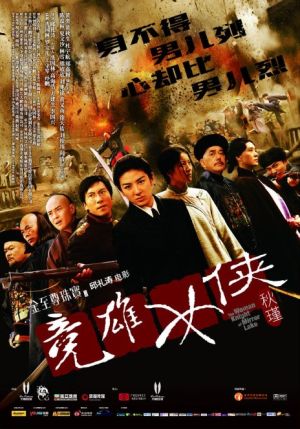 I find the line between “terrorist” and “freedom fighter” an interesting one, drawn not so much by any objective measure, but by the viewer’s perspective and historical hindsight. Qiu Jin is a good example: she fought against the perceived oppression – particularly of women – by the Qing dynasty in the early 20th century, and ended up getting publicly beheaded for her support of revolutionary factions, by the government of the time. Now? A heroine and a martyr, who has an official museum ‘n’ stuff. Funny how things work out.
I find the line between “terrorist” and “freedom fighter” an interesting one, drawn not so much by any objective measure, but by the viewer’s perspective and historical hindsight. Qiu Jin is a good example: she fought against the perceived oppression – particularly of women – by the Qing dynasty in the early 20th century, and ended up getting publicly beheaded for her support of revolutionary factions, by the government of the time. Now? A heroine and a martyr, who has an official museum ‘n’ stuff. Funny how things work out. To be honest, I have very little clue about what was going on here. Oh, the basics are clear enough. After losing their patriarch General Yang Zongbao (Ren) in battle, a noble family opts to send everyone out to the West to defend the realm from the usual invaders. They’re almost entirely female, but all possess significant ass-kicking ability, with their own particular weapon of choice. These are listed, in rapid order, near the start of the movie, and I’d suggest taking copious notes, because you won’t be able to recognize them otherwise: one armour-clad woman looks very much like another when they’re in battle. It’d probably have helped if they’d had a number on the back of their helmets or something. Hey, it’s not like this is a model of historical accuracy to begin with.
To be honest, I have very little clue about what was going on here. Oh, the basics are clear enough. After losing their patriarch General Yang Zongbao (Ren) in battle, a noble family opts to send everyone out to the West to defend the realm from the usual invaders. They’re almost entirely female, but all possess significant ass-kicking ability, with their own particular weapon of choice. These are listed, in rapid order, near the start of the movie, and I’d suggest taking copious notes, because you won’t be able to recognize them otherwise: one armour-clad woman looks very much like another when they’re in battle. It’d probably have helped if they’d had a number on the back of their helmets or something. Hey, it’s not like this is a model of historical accuracy to begin with.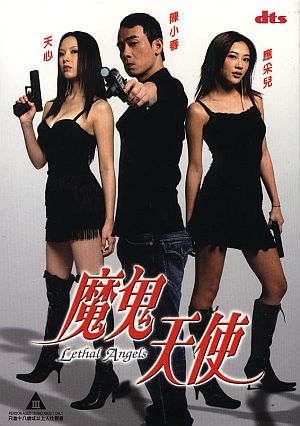 Winnie (Lee) has a grudge: against gang boss Bowen (Yuan) in particular, but also against just about any man who abuses women. She puts together a team of four underlings, such as Yoyo (Sum), whose family was killed by thugs, and uses them to take out anyone whose lustful desires overwhelm their common sense. Now, it’s time for the big one: Bowen. Winnie sends Yoyo in as an undercover nanny, to scope things out and obtain evidence of Bowen’s illegal dealings. However, once in, she finds out that Bowen is now largely reformed, and Yoyo also objects to Winnie’s plan to wipe out all of Bowen’s family, including his six-year old daughter. Meanwhile, she’s also being investigated by Jet (On), a cop who knew and almost dated her at college, and is on the case of the mysterious deaths of mob bosses at the hands of beautiful ladies.
Winnie (Lee) has a grudge: against gang boss Bowen (Yuan) in particular, but also against just about any man who abuses women. She puts together a team of four underlings, such as Yoyo (Sum), whose family was killed by thugs, and uses them to take out anyone whose lustful desires overwhelm their common sense. Now, it’s time for the big one: Bowen. Winnie sends Yoyo in as an undercover nanny, to scope things out and obtain evidence of Bowen’s illegal dealings. However, once in, she finds out that Bowen is now largely reformed, and Yoyo also objects to Winnie’s plan to wipe out all of Bowen’s family, including his six-year old daughter. Meanwhile, she’s also being investigated by Jet (On), a cop who knew and almost dated her at college, and is on the case of the mysterious deaths of mob bosses at the hands of beautiful ladies.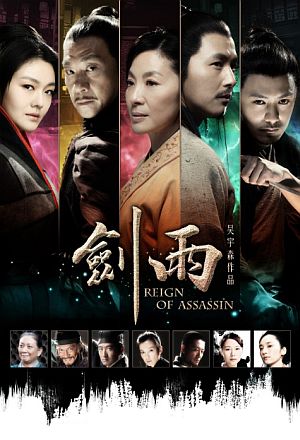 The most disappointing film of 2010? I went in with huge expectations, based on reviews that said, “The best swordplay film since Crouching Tiger, Hidden Dragon..” O RLY? I know Crouching Tiger. Crouching Tiger is one of my favourite movies. And Reign of Assassins, you’re no Crouching Tiger. It’s a confused, poorly-shot mess that proved a struggle to endure and a challenge to stay awake, right from the opening lump of introduction. Stick with me for this synopsis. The remains of a Buddhist monk, split in two, are said to turn whoever has them into a kung-fu master. The Dark Stone gang, under the Wheel King (Wang), want to possess them, and get one half, but gang member Drizzle makes off with the body parts, undergoes plastic surgery that turns her into Michelle Yeoh and takes up a quiet life as a fabric seller. She meets and marries Jiang Asheng (Jung), until her secret identity is revealed in a bank raid, and the Dark Stone gang come after her again. However, turns out Jiang isn’t who he seems either…
The most disappointing film of 2010? I went in with huge expectations, based on reviews that said, “The best swordplay film since Crouching Tiger, Hidden Dragon..” O RLY? I know Crouching Tiger. Crouching Tiger is one of my favourite movies. And Reign of Assassins, you’re no Crouching Tiger. It’s a confused, poorly-shot mess that proved a struggle to endure and a challenge to stay awake, right from the opening lump of introduction. Stick with me for this synopsis. The remains of a Buddhist monk, split in two, are said to turn whoever has them into a kung-fu master. The Dark Stone gang, under the Wheel King (Wang), want to possess them, and get one half, but gang member Drizzle makes off with the body parts, undergoes plastic surgery that turns her into Michelle Yeoh and takes up a quiet life as a fabric seller. She meets and marries Jiang Asheng (Jung), until her secret identity is revealed in a bank raid, and the Dark Stone gang come after her again. However, turns out Jiang isn’t who he seems either…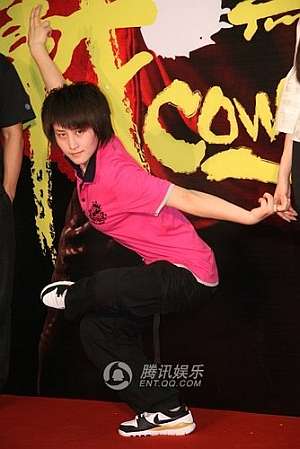 It’s nice to see Hong Kong making a decent action heroine film: that’s really where the genre started off, and it’s been responsible for some of the best entries in the field. That said, this doesn’t quite deserve to be placed on the same level, but star Jiang Lui Xia certainly has her potential – my immediate thought is to put her in the same film as Jeeja Yanin, and we might really have something. [Sidenote: Jiang got her big break as the result of a couple of unusual ways. Viral videos she posted on the Internet, which in turn got her a slot on a reality show called The Disciple in Hong Kong, produced by Jackie Chan. The winner – not her – got to star in a feature.] Much like her Thai colleague, Jiang is clearly a martial artist first, and actress…well, probably fifth or sixth, despite her resemblance to Shin Eun Kyung from My Wife is Gangster. She seems to have three expressions, used in strict rotation, and the plot is frankly implausible nonsense too.
It’s nice to see Hong Kong making a decent action heroine film: that’s really where the genre started off, and it’s been responsible for some of the best entries in the field. That said, this doesn’t quite deserve to be placed on the same level, but star Jiang Lui Xia certainly has her potential – my immediate thought is to put her in the same film as Jeeja Yanin, and we might really have something. [Sidenote: Jiang got her big break as the result of a couple of unusual ways. Viral videos she posted on the Internet, which in turn got her a slot on a reality show called The Disciple in Hong Kong, produced by Jackie Chan. The winner – not her – got to star in a feature.] Much like her Thai colleague, Jiang is clearly a martial artist first, and actress…well, probably fifth or sixth, despite her resemblance to Shin Eun Kyung from My Wife is Gangster. She seems to have three expressions, used in strict rotation, and the plot is frankly implausible nonsense too.